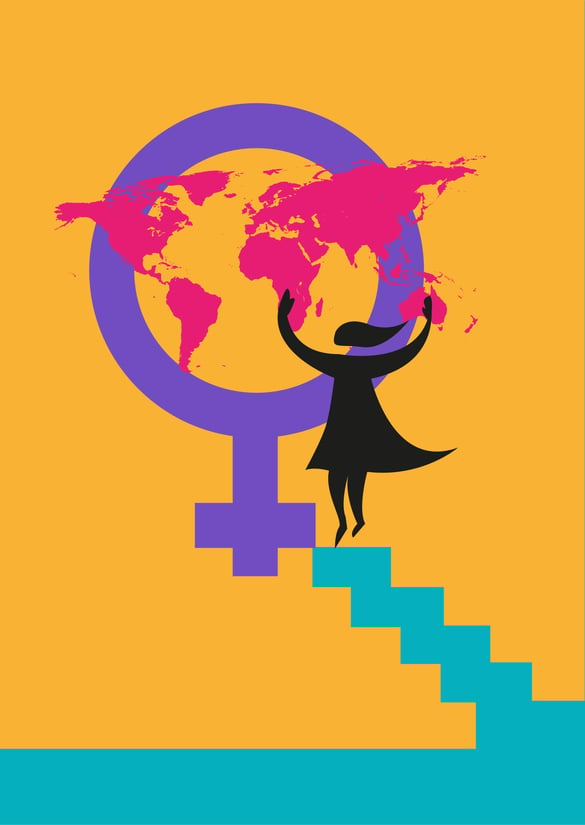
As the global lifestyle becomes the norm in many organizations, do women face different challenges than men? A recent Harvard Business Review article "Leading Across Cultures Is More Complicated for Women" argues there is a need for a gender-based approach to learning and development.
Women have battled for decades to be treated as the equal of their male colleagues. They have proven that they can endure the hours, workload, travel, time away from home, and juggle conflicting demands without being held to a lower standard because of their sex. Yet, when they conduct business outside their home country, women are often at a marked disadvantage because they must overcome hurdles that are not there for men. In fact, quite often the very behaviors that helped the woman achieve success at home hinder her progress abroad.
It often starts with how they dress. When traveling to Argentina or Brazil, businesswomen are expected to dress fashionably, devote time to their hairstyle, make-up and even their manicure. Then, when they arrive at the office, they must gracefully submit to male comments about their appearance – something that would be unheard of at home. It can be quite a change in mindset to smile and say thank you or nothing at all when a businesswoman hears commentary about her appearance. Yet, if she does not adhere to these accepted norms, her professionalism may be questioned by locals.
In many parts of the world, foreigners are asked intrusive personal questions as a way to get to know them. In addition to the questions posed to men, women may also be asked about their marital status and the number of children they have. If the woman has children, this often leads to extended questions about childcare arrangements as well as how much she misses the children while away on business. Knowing that these questions will be asked allows the businesswoman to prepare a stock answer in advance so that she handles the situation with grace and aplomb.
A foreign businesswoman in Japan is considered a foreigner first and a woman second. This is a subtle, but extremely important fact. It allows the Japanese to grant her "honorary man" status and treat her as they would a foreign businessman. At the same time, the businesswoman should be cognizant of the height differential and wear flat shoes so that she does not tower over the Japanese businessmen.
Personal relationships are crucial in Asia. In Japan and China, savvy businesspeople invest time in developing, nurturing and maintaining relationships – before they arrive, while they're there and when they return home. Since many older businessmen have difficulty seeing a businesswoman as the final authority, if the businesswoman works on relationship building before arriving, she demonstrates cultural competency and she will face fewer difficulties.
In Thailand, a businesswoman should present a positive attitude, a sense of humor, and a win-win attitude to develop a rapport. At the same time, the businesswoman must appear modest, since humility is an integral part of the Thai culture. Women are expected to speak softly because a loud voice is considered immodest, and avoid displaying anger or emotion, which are seen as loss of control.
In Asia and Latin America, Western women are often viewed as too forceful, strident, and strong-willed whereas the expected behavior is for the woman to assert her influence and authority in a restrained manner. To be most successful in these parts of the world, the businesswoman must know how to act as a coach and guide people to the desired outcome rather than make concrete statements. This can be a cultural shift for American women who have learned to speak clearly and concisely and present a well-ordered business case. It also raised the question – would Nordic women, who work in team-focused organizations face less of a cultural shift in Asia and Latin America?
Eye contact in Asia is not as direct as it is in many Western countries. This is especially important for a businesswoman to understand so that she does not inadvertently cause offense. She should break eye contact several times while conversing. During the greeting process, a foreign woman should look the other person in the eye and then lower their eyes to demonstrate respect and humility. This sounds simple, but it is a new behavior that must be practiced in order to make it appear natural.
In Germany, foreign businesswomen may be asked repeated questions about their credentials and experience. Given the importance of credentials and experience, the questions are to confirm the businesswoman’s expertise. Businesswomen may be subjected to more questioning than a male colleague would be.
In many cultures, the office is not the place to be overly enthusiastic, expressive, or emotional. If a businesswoman is naturally enthusiastic, she may want to moderate her behavior to be more similar to what local businesspeople expect.
So, how does a woman learn these skills? A great place to start is CultureWizard's Country Profiles, which have a section on Women where you can learn the tips of foreign businesswoman as well as specific behaviors that will enhance your credibility. Then, the savvy female will practice these behaviors and success will follow.


